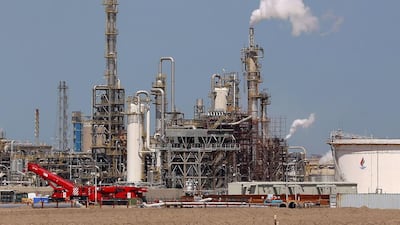The Covid-19 crisis has understandably jolted the global energy system, with the impact strongly felt in the GCC countries that have long been supported by the hydrocarbon sector.
With Brent crude prices nearing $20 a barrel as of late March 2020 (the lowest price in nearly two decades), governments face a number of challenges. Despite its severity, energy players in the GCC—including governments and their national oil, gas, petrochemical, and utilities companies—can treat this crisis as an opportunity to refocus on long-term sustainability. Instead of waiting for the crisis to pass, these entities can take bold action today and reinforce long-discussed reforms to become more resilient and prepare for a world that relies far less on fossil fuels.
In a worst-case scenario in which oil remains at $20 a barrel for a year, we estimate that GCC governments could lose up to $500 million (Dh1.83 billion) a day in state oil revenue. Energy players in the region must now walk a fine line between urgent and important decisions, balancing short, medium and long-term trade-offs to navigate through the crisis.
Already, many energy organisations have taken impressive steps to mobilise, by maintaining business continuity and supporting national response plans in the face of immense challenges. Some forward-looking players are seeking to stabilise, building their resilience in the medium term through cost reduction programmes, employee development initiatives and other measures to prepare for the recovery.
Those are critical areas of focus. The most transformative changes will come through longer-term strategic assessments. Broadly, the energy sectors of the GCC have three options against which to start taking immediate action: retrench, rethink or repower.
Retrench
The most conservative approach is to assume that the fundamentals of the energy industry will quickly reassert themselves after the pandemic. According to this line of thinking, there is no need for a substantial pivot. Instead, governments can adopt a wait-and-see approach, postponing major actions until oil prices recover. In the meantime, they can focus on reducing costs and defer any development projects or other discretionary spending. The logic behind this argument is that if crude prices remain low, oil remains the most attractive source of power and few users will switch to alternatives.
Rethink
The middle-ground approach is for governments to acknowledge that Covid-19 revealed some structural vulnerabilities in the energy sector and take steps to remediate them. A key aspect is reinforcing efforts to build domestic supply chains and capabilities. Previously, local-content initiatives sought to create jobs and diversify GCC economies. Those were noble aims, but the crisis has demonstrated the fragility of global supply chains and the imperative to produce all that you need to operate within your borders.
Under the “rethink” approach, companies could invest in chemicals and industrial clusters that provide a means to integrate along the value chain. Energy players could also localise materials supply chains and supporting capabilities, through on-demand manufacturing, research and development and specialised technical education and training. Digitisation initiatives will lead to greater efficiency and companies can move toward the “circular economy”, in which limited resources are obsessively recycled to reduce waste.
Repower
The most ambitious strategic approach is to treat the pandemic as an opportunity to fundamentally reshape the energy sector and prepare for the long-term global transition away from carbon-based resources. This strategy would require bold action in several areas. First, energy players can acquire global assets at currently reduced prices in order to gain scale in downstream conversion industries. That would provide these players with access to international markets.
Even more ambitious, energy companies in the region could lead the way in incubating clean and renewable energy businesses. Critically, these cleaner power sources would supplement—or replace—the regional consumption of hydrocarbons, enabling companies to extract the maximum possible export and conversion value from their remaining reserves, even in a world with long-run low oil prices and heightened sustainability concerns. As a result, the GCC could create a new economy that would ultimately replace revenue from crude oil sales with value coming from new activities such as green hydrogen production and environmentally-sustainable heavy industries.
This is a bold vision, but we believe it represents the best path forward. Oil-dependent governments in the GCC must do more than merely hope for the past to return. Instead, they must seize the opportunity to transform.
James Thomas and Anil Pandey are partners at Strategy& Middle East, part of the PwC network

